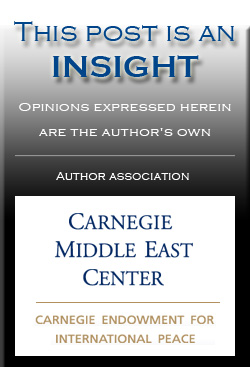
One hundred years after the Levant embarked on a journey to build modern political societies, our experiment has failed and we are now back to square one. Lebanon collapsed in the 1970s, Iraq disintegrated in the 1990s and 2000s, and Syria is in the process of tearing itself apart. Unlike Egypt, Tunisia, and several other Arab countries, we have managed to keep neither nation nor state intact. As we in the Levant – or what we refer to in Arabic as the Mashrek – enter a period of profound division and uncertainty, will we be able to find a path to national unity and modern statehood? Or is our decline into disunity and conflict inexorable?
 One hundred years ago, our forefathers were part of an Arab awakening (nahda) that sought to replace the declining Ottoman order with modern nation-states built on the principles of self-determination, equality, women’s empowerment, social justice, and economic progress. As the Ottoman order collapsed, Arabs were challenged by new political divisions created by the Sykes-Picot agreement and the European mandates. Nevertheless, we had the opportunity to build democratic political institutions, active civil societies, and modern educational and economic structures. It was a time of great political creativity, and many movements and parties were founded that endeavored to shape a better Arab future.
One hundred years ago, our forefathers were part of an Arab awakening (nahda) that sought to replace the declining Ottoman order with modern nation-states built on the principles of self-determination, equality, women’s empowerment, social justice, and economic progress. As the Ottoman order collapsed, Arabs were challenged by new political divisions created by the Sykes-Picot agreement and the European mandates. Nevertheless, we had the opportunity to build democratic political institutions, active civil societies, and modern educational and economic structures. It was a time of great political creativity, and many movements and parties were founded that endeavored to shape a better Arab future.
Although World War II provided independence and an end to Ottoman and European rule, our hope for political progress slowed rather than quickened. Movements that preached unity and freedom came to power only to establish one-party police states that fueled conflicts among Arab states. In some countries, nascent democratic institutions were enthusiastically swept away in favor of totalitarian dictatorships; while in others they were left to weaken and decline. Ambitions of national unity and equal citizenship were thrown out in favor of domination by some communities over others. In countries with a weak central state like Lebanon, national disintegration showed early both in 1958 and more devastatingly again in 1975. In Syria and Iraq, the iron fist of dictatorship delayed disintegration but made it all the more painful when it finally arrived.
“Without new ideas and new movements to unite our societies and point to a collective, rational, and inclusive path forward, we will continue to sink deeper into division and decay.” – Paul Salem, Carnegie Middle East Center

A woman walks past a house reportedly destroyed by an airstrike by Syrian government forces in Azaz city December 18, 2012. (Reuters)
The youth of the Arab Spring recaptured the spirit of the Arab Nahda by calling for freedom, national unity, social justice, and economic progress. But in the Mashrek, the atavisms of confessionalism, ethnicity, and tribalism, again proved to have a stronger and more contradictory pull. In Iraq, the Maliki government has seized upon the recent withdrawal of U.S. troops to eliminate domestic opponents – irrespective of the disintegration and near civil war into which the country is now heading. In Syria, the Assad regime, supposedly founded on the Baathist principles of unity, freedom, and socialism, is intent on fueling sectarian civil war by bludgeoning its people into submission and protecting the billions of dollars accumulated by its corrupt leaders. For its part, the Syrian opposition, who initially broadly agreed on a democratic and pluralist post-Assad order, is now being overrun by a radical jihadist movement that wants to establish an ultra-conservative Islamic state that would make the Ottoman Empire look like Switzerland. And in Lebanon, the only proposal was a backwards ‘Orthodox’ election law that resembles the political arrangements of an earlier Ottoman period, where each sect (millet) lived a separate political existence without participation in any cumbersome national project.
Clearly, our Mashrek is politically bankrupt. Without new ideas and new movements to unite our societies and point to a collective, rational, and inclusive path forward, we will continue to sink deeper into division and decay.

Lebanese Sunni Islamists shout slogans as they carry coffins of Lebanese Islamist militants after their bodies arrived from Syria, in Tripoli, northern Lebanon December 22, 2012. (Reuters)
But where are the ideas that will carry us forward? Early dreams of Arab unity clashed with the realities of divisiveness and authoritarianism. If we were not able to maintain unity and freedom in the Mashrek, what chance could we have had to it in much larger political units? The ambitions of Arab socialism clashed with the realities of corruption and abuse of power. The momentum of civil society was undermined by the pull of kinship and ethnic, religious, and tribal affiliation. The drive for women’s empowerment came against pervasive Arab patriarchy, and the attempt to build citizenship and national identity failed in the face of more powerful communal identities.
As the late Ghassan Tueni described it, the 20th century has been a ‘lost century’ for Arab societies. We find ourselves now in an even worse position than where we began in 1913. Then, our region was buzzing with activity and optimism to build a democratic, united, and prosperous Arab future. We were emerging from five centuries of stifling Ottoman rule, and hoping to use emancipation to build a new and prosperous civic order. Today, we are no longer under foreign dominion, yet we lack a unifying vision or a common hope. With each community eager to maximize its dominance or advantage over the other, we have destroyed the common project that could have provided security, dignity, participation, and prosperity for all.
Our emergence from this dark night will take many years. We must first appreciate the depth of division and dysfunction to which we have sunk, and then we must begin to formulate a real path out of this hellish reality. Any new project must build on the principles of freedom, democracy, social justice, and economic progress – goals that were renewed by the youth of the Arab uprisings. Then we must organize the social and political movements that will get us there even if it takes many long years to accomplish.
We have already wasted one century, but let us not waste another.
The English version of this post was authored exclusively for MEV by Carnegie Middle East Center. On Twitter, the Center can be followed at @CarnegieMEC. Click here for an Arabic version provided by the Center.
The views expressed in this Insight are the author’s own and are not endorsed by Middle East Voices or Voice of America. If you’d like to share your opinion on this post, you may use our democratic commenting system below. If you are a Middle East expert or analyst associated with an established academic institution, think tank or non-governmental organization, we invite you to contribute your perspectives on events and issues about or relevant to the region. Please email us through our Contact page with a short proposal for an Insight post or send us a link to an existing post already published on your institutional blog.
Paul Salem
Paul Salem is the director of the Carnegie Middle East Center in Beirut, Lebanon. On Twitter, he can be followed at @Paul_Salem.